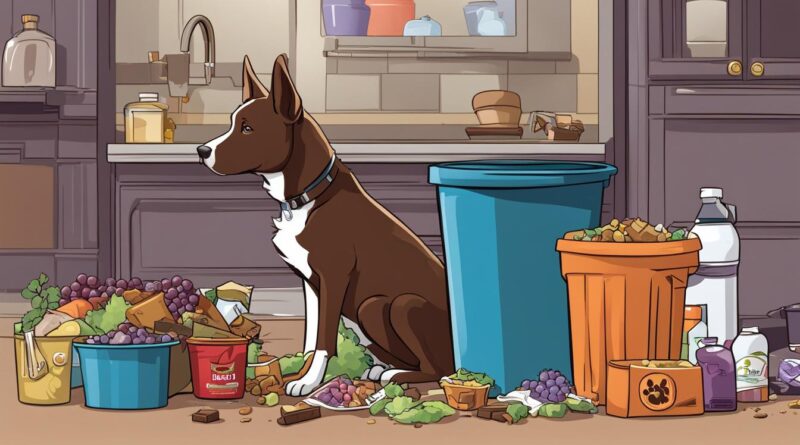Dog Diarrhea and Vomiting: Causes & Relief
As much as we love our furry companions, it breaks our hearts when they fall sick. Dog diarrhea and vomiting can be distressing for both you and your pooch. Understanding the underlying causes and finding appropriate remedies can provide much-needed relief for your pet. In this article, we will explore the causes and treatments for dog diarrhea and vomiting, as well as when to seek veterinary care for your pet.
Key Takeaways:
- Diarrhea and vomiting can be caused by dietary changes, stress, infections, and other factors.
- Identifying the root cause of your dog’s symptoms is crucial for effective treatment.
- Remedies for dog diarrhea and vomiting include dietary adjustments, hydration, and over-the-counter medications.
- Knowing when to seek veterinary care can prevent complications and ensure your pet’s overall health.
- By taking proactive steps and ensuring your dog’s well-being, you can reduce the risk of these uncomfortable digestive issues.
Understanding Dog Diarrhea
Dog diarrhea is a common ailment that can be caused by a range of factors. It is essential to understand the underlying causes to determine the appropriate remedies for your pet. Here are some of the common reasons for dog diarrhea and vomiting:
- Dietary changes – feeding your pet table scraps or changing their diet can cause digestive issues.
- Stress – just like with humans, stress and anxiety can cause your pet to experience diarrhea and vomiting.
- Parasites – worms and other parasites can cause diarrhea and vomiting in dogs.
- Infections – viral, bacterial, and fungal infections can irritate your dog’s digestive system leading to diarrhea and vomiting.
- Allergies – food and environmental allergies can also provoke digestive upsets in dogs.
Identifying the root cause of your dog’s diarrhea can guide you towards appropriate remedies that may range from dietary adjustments and hydration to medication. In the next section, we will explore how to identify the causes of dog vomiting.
Identifying the Causes of Dog Vomiting
In dogs, vomiting can be a common occurrence and may be caused by various factors. In this section, we will explore the common reasons for dog diarrhea and vomiting, so you can better identify the root cause and provide the necessary care for your furry friend.
Dietary Indiscretion
One of the most common reasons for dog vomiting is dietary indiscretion. This may include eating spoiled or rotten food, consuming garbage, or overeating. Dogs may also experience vomiting if they eat too quickly or drink too much water during or after a meal.
Infections
Infections can also cause vomiting in dogs. These may include bacterial or viral infections, as well as parasitic infections such as roundworms, hookworms, and giardia. If your dog is vomiting along with diarrhea, it may be a symptom of a more severe gastrointestinal infection.
Gastrointestinal Issues
Gastrointestinal issues, such as pancreatitis or inflammatory bowel disease, can also trigger vomiting in dogs. These conditions can cause inflammation or damage to the digestive system, which may lead to vomiting and other symptoms such as diarrhea and weight loss.
Other Potential Triggers
Other potential triggers of dog vomiting include stress, motion sickness, certain medications, and poisoning from toxic substances such as household cleaners, plants, or human food. In some cases, vomiting may be a symptom of a more severe underlying health issue, such as kidney or liver disease, cancer, or organ failure.

It’s essential to identify the root cause of dog vomiting, as it may indicate a more significant issue. If you notice persistent or severe vomiting, along with other concerning symptoms, it’s best to consult your veterinarian to determine the appropriate treatment plan.
Remedies for Dog Diarrhea and Vomiting
If your furry friend is experiencing diarrhea or vomiting, there are several remedies to consider. In some cases, simple dietary adjustments can help alleviate symptoms. We suggest feeding your dog bland foods such as rice, cooked chicken, and low-fat cottage cheese. It’s important to avoid any foods that could exacerbate symptoms and trigger further discomfort.
Pro-Tip: Hydration is crucial for managing diarrhea and vomiting. Ensure your dog has access to plenty of clean drinking water and consider adding a bit of chicken broth to encourage drinking.
In cases where symptoms persist or are severe, over-the-counter medications can help alleviate discomfort. Pepto-Bismol, Kaopectate, and Imodium are effective options for managing diarrhea, but should only be used under the guidance of a veterinarian.
Note: While over-the-counter medications can be helpful, it’s important to avoid any medications that contain salicylates or aspirin, as these can be toxic to dogs.
Pro-Tip: Probiotics and digestive enzymes can also help soothe your pet’s upset stomach and promote healthy digestion. Consult with your vet to determine the best course of action.
In more serious cases, your veterinarian may recommend prescription medication or other interventions to manage symptoms. Always seek veterinary care if your dog’s symptoms persist or worsen, or if you’re unsure about how to proceed.
Bland Food Diet Recipe:
| Ingredients | Instructions |
|---|---|
| 1 cup cooked white rice | Boil in 2 cups of water until soft, then drain and cool. |
| 1 cup cooked boneless, skinless chicken breast | Preheat oven to 375 degrees F. Place chicken on a baking sheet and season with salt and pepper. Bake for 25-30 minutes, or until cooked through. Chop into small pieces. |
| 1/4 cup low-fat cottage cheese | Stir in with rice and chicken |
When to Seek Veterinary Care
At times, dog diarrhea and vomiting can be challenging to manage at home. While most episodes resolve without intervention, some can indicate a more serious underlying condition that requires veterinary care.
- If your dog shows signs of dehydration such as lethargy, dry gums, and skin elasticity, seek veterinary attention promptly. Dehydration can be especially dangerous for puppies and senior dogs.
- If your dog becomes feverish or shows signs of pain, such as discomfort when touched around the abdomen, seek veterinary care.
- If your dog has been vomiting or experiencing diarrhea for more than 24 hours, seek veterinary care for diagnosis and treatment.
- If your dog’s diarrhea is accompanied by blood or a foul odor, seek veterinary care.
- If your dog has recently ingested a potentially harmful substance or object, seek veterinary care immediately, even if they are not showing symptoms yet.
When it comes to the well-being of our furry friends, it’s always better to err on the side of caution. Your veterinarian can provide appropriate diagnosis and treatment to help your dog feel better quickly. Timely intervention can prevent minor issues from developing into something more serious.
Conclusion
Managing dog diarrhea and vomiting can be a challenging task for pet owners. However, by understanding the causes and implementing appropriate remedies, you can help prevent these uncomfortable digestive issues in your furry companion.
When it comes to preventing dog diarrhea and vomiting, maintaining their overall health is key. Regular exercise and a balanced diet can help prevent dietary indiscretion, one of the common causes of these issues. Additionally, regular check-ups with your veterinarian can help identify potential health issues early on.
In case of an emergency, it’s crucial to know when to seek veterinary care. If your dog shows symptoms such as continuous vomiting and diarrhea, lethargy, fever, loss of appetite, and abdominal pain, it’s best to consult a veterinarian immediately.
We hope this article has provided valuable insights into managing and preventing dog diarrhea and vomiting. Remember, your furry friend’s health is in your hands. By taking proactive steps and maintaining good health practices, you can ensure a happy and healthy life for your four-legged companion.
FAQ
What are the common causes of dog diarrhea and vomiting?
Dog diarrhea and vomiting can be caused by a variety of factors, including dietary changes, ingestion of toxins or foreign objects, infections, parasites, stress, food allergies or intolerances, and underlying health conditions.
How can I determine the cause of my dog’s diarrhea?
If your dog has diarrhea, it’s essential to consider recent changes in their diet or environment, examine their stool for signs of blood or unusual consistency, and observe their behavior for other accompanying symptoms. However, it’s always advisable to consult a veterinarian for a proper diagnosis.
What can cause my dog to vomit?
Dog vomiting can be triggered by various factors, including eating too quickly, dietary indiscretion, infections, gastrointestinal issues (like gastritis or pancreatitis), certain medications, motion sickness, and more.
How can I help relieve my dog’s diarrhea and vomiting?
When your dog has diarrhea and vomiting, it’s crucial to provide plenty of fresh water and offer a bland diet (e.g., boiled chicken and rice) to soothe their stomach. You can also try over-the-counter medications designed for dogs with diarrhea or vomiting after consulting with your veterinarian.
When should I seek veterinary care for my dog’s diarrhea and vomiting?
You should consult a veterinarian if your dog’s diarrhea and vomiting persist for more than 24 hours, are accompanied by other concerning symptoms (e.g., lethargy, loss of appetite, dehydration), or if you suspect they may have ingested something toxic or potentially harmful.
How can I prevent my dog from experiencing diarrhea and vomiting?
To help prevent dog diarrhea and vomiting, it’s essential to provide a balanced and suitable diet, ensure they have access to clean water, avoid exposing them to potential toxins or spoiled food, practice good hygiene, and keep up with their vaccination and deworming schedule.

